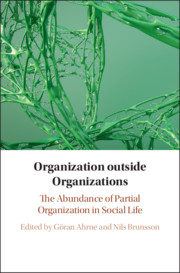Book contents
- Organization outside Organizations
- Organization outside Organizations
- Copyright page
- Contents
- Preface
- Contributors
- Introduction
- Part 1 Rules, Sanctions, Membership
- 2 Standards between Partial and Complete Organization
- 3 Prizes and the Organization of Status
- 4 Membership or Contributorship? Managing the Inclusion of Individuals into Organizations
- Part 2 Organization in and around Markets
- Part 3 Networks and Other Social Relationships
- Part 4 Social Movements and Collective Action
- Part 5 The Partial Organization of Formal Organizations
- Conclusion
- Index
- References
3 - Prizes and the Organization of Status
from Part 1 - Rules, Sanctions, Membership
Published online by Cambridge University Press: 11 July 2019
- Organization outside Organizations
- Organization outside Organizations
- Copyright page
- Contents
- Preface
- Contributors
- Introduction
- Part 1 Rules, Sanctions, Membership
- 2 Standards between Partial and Complete Organization
- 3 Prizes and the Organization of Status
- 4 Membership or Contributorship? Managing the Inclusion of Individuals into Organizations
- Part 2 Organization in and around Markets
- Part 3 Networks and Other Social Relationships
- Part 4 Social Movements and Collective Action
- Part 5 The Partial Organization of Formal Organizations
- Conclusion
- Index
- References
Summary
In this chapter, we analyse prizes as forms of partial organization, particularly focusing on prizes as one way to organize approval procedures. A basis for this view is that prizes are based on decisions and thus constitute a sanctioning mechanism to actors. Our aim is to explore the characteristics and potential effects of prizes as partial organization. We use prizes in the fields of science and sports as empirical examples to answer these questions. Based on our definition of prizes as publicly communicated decisions of approval, we explore three ways in which prizes vary: the uses of rules; membership; and communication of prizes and prize decisions. From this, two main strategies for prize giving are identified: one more organized and the other more ‘mystical’. The first uses elements of formal organization to formulate rules or membership criteria, and to communicate them to both the potential prize recipients and the audience. The second lacks these elements, which engulf prizes in an aura of mystery. From this finding, we explore some potential and observed effects of prizes on actors’ behaviours, on status and status positions in fields in which the actors operate, and on prize givers themselves.
- Type
- Chapter
- Information
- Organization outside OrganizationsThe Abundance of Partial Organization in Social Life, pp. 62 - 83Publisher: Cambridge University PressPrint publication year: 2019
References
- 4
- Cited by

